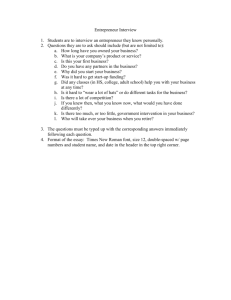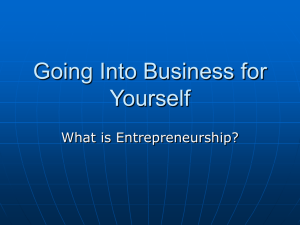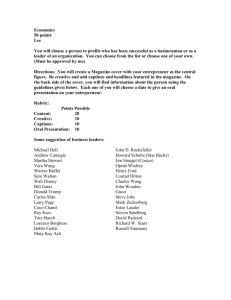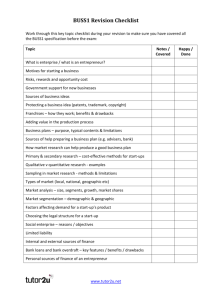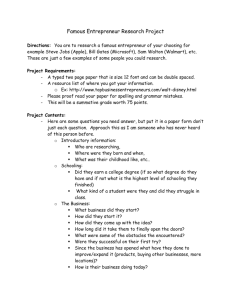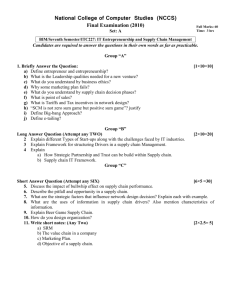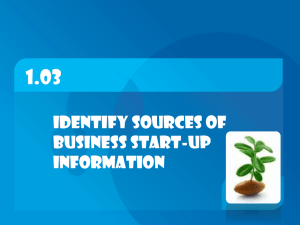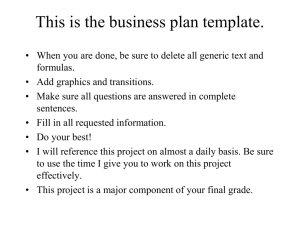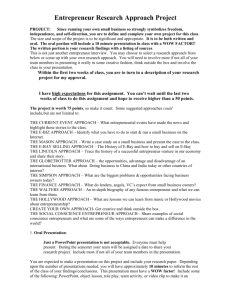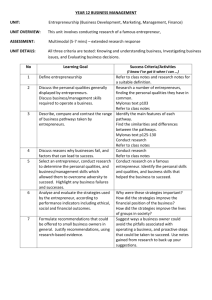Re-Cap of Previous Lessons: Plan to Start
advertisement
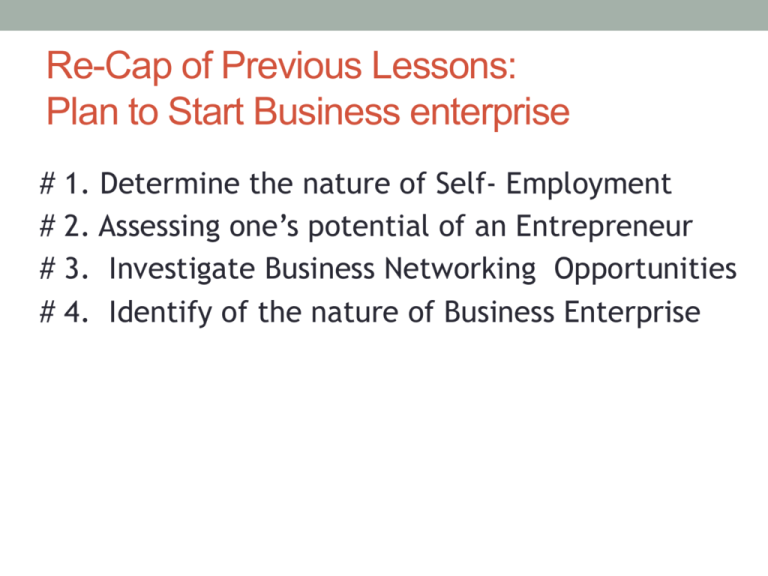
Re-Cap of Previous Lessons: Plan to Start Business enterprise # # # # 1. Determine the nature of Self- Employment 2. Assessing one’s potential of an Entrepreneur 3. Investigate Business Networking Opportunities 4. Identify of the nature of Business Enterprise 301. CARRY OUT AN INVESTIGATION OF BUSINESS ENTERPRISE Lesson 2 ENTERPRISE PLANNING • Plan to start a business enterprise Week 1-3 1. Determine the nature of self-employment 2. Assess one’s potential as an entrepreneur 3. Investigate business networking opportunities. 4. Identify the nature of ‘ Business Enterprise ‘ • Carry out an investigation of a business enterprise Week 4-9 1. Generate business ideas 2. Examine business goals and objectives, Intrigrity and Entrepreneurship 3. Choose a start-up strategy 4. Estimate resource requirement 5. Identify legal issues and regulations • Prepare a business enterprise plan. Week 10 onwards Part 1: Generate ideas • Lesson Objective: • To be able to define what is ‘ideas’? • How it develops ? • and how it reproduces into something that is ‘New’ or ‘Adapt to improve better’ or ‘Copy’? Generate the business ideas • Where does an entrepreneur come up with the idea for his/her business? In practice there are many ways in which the business opportunity and idea is first spotted. As we shall see, sometimes luck plays a big part; at other times there is a role for approaches which encourage deliberate creativity. Here are some of the main sources of business ideas for start-ups: 1. Business Experience • Many ideas for successful businesses come from people who have experience of working in a particular market or industry. ! Continue – Business Experience • For the start-up, there are several advantages of applying this experience to a new business: • Better and more detailed understanding of what customers want • Knowledge of competitors, pricing, suppliers etc • Less need for start-up market research • Entrepreneur is able to make more realistic assumptions in the business plan about sales, costs etc • Industry contacts, who might then become the first customers of the start-up Sources of Business Ideas – cont’d 2. Personal Experience • Many ideas come to entrepreneurs from their day-to-day dealings in life, or from their hobbies and interests. For some of us, frustrating or bad experiences are a source of irritation. For the entrepreneur they might suggest a business opportunity. Continuation- Personal experience • It is often said that one of the best ways to spot a business opportunity is to look for examples of poor customer service (complaints, product returns, persistent queues etc). • Such examples suggest that there is an opportunity to do something better, quicker or cheaper than the existing products. Sources of Business Ideas – cont’d • Hobbies and interests are also a rich source of business ideas, although you have to be careful to avoid assuming that, just because you have a passion for collecting rare objects, there is a ready market from people with similar interests! Sources of Business Ideas – cont’d 3. Observation • Simply observing what goes on around you can be a good way of spotting an idea. Often an idea will be launched in another country and has not yet been tried in other, similar economies. • When Stephen Waring was in the USA attending a wedding, by luck he sat next to someone who ran a household service business (treating lawns). After some brief market research, Stephen found out that there was no similar business in the UK, so he launched one. It has since become a hugely successful franchise business – Green Thumb. RE-CAP: WHAT AND WHERE DO IDEAS COMES FROM? Next Lesson: • Examining Business Goals and Objectives. • Integrity and Entrepreneurship

